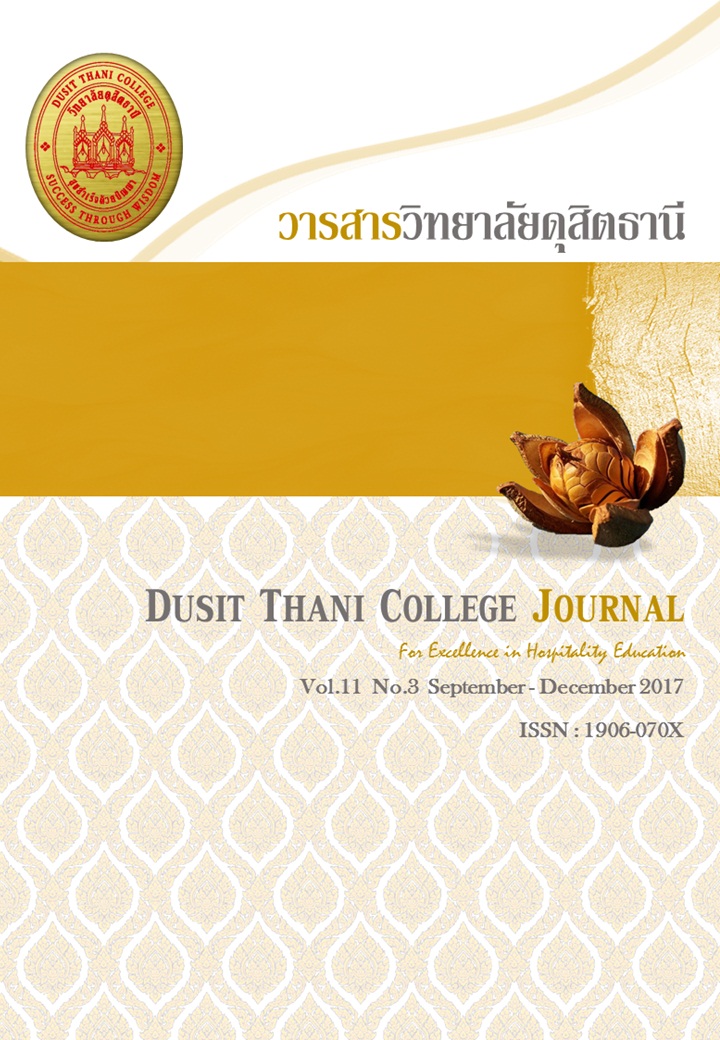Conservation of Mahout Local Wisdom Based on Green Tourism
Main Article Content
Abstract
This article’s aimed to conserve mahout local wisdom along with the natural environment by utilising activities in mahout training program of Thailand Elephant Conversation Center National Elephant Institute - Thai Elephant Conservation Center. The article is based on the study which has its objective to combine the conservation of the mahout local wisdom and tourism, leading to sustainable growth of tourism business. Analysis of the data collected from interviews given by experts from the mahout training school and the Thailand elephant conservation center pointed out the abilities and knowledge that make up the mahout local wisdom which were 1) elephants’ nutrition 2) elephants’ behaviours 3) making elephants training equipment 4) training elephants 5) bathing elephants and 6) building elephant pens. Using these aspects of mahout local wisdom, tourism activities can be organized, such as “Route of Khua Sa Ba” activity which was corresponding to the elephant bathing local wisdom and “Growing grass activities” activity which was corresponding to the elephant nutrition local wisdom. These activities help conservation of mahout local wisdom and opening new windows for tourism.
Article Details
Article Screening Policy
- All research and academic articles to be published must be considered and screened by three peer reviews in the relevant field / article.
- All articles, texts, illustrations and tables published in the journal are the personal opinions of the authors. Editors don't always have to agree. And no responsibility whatsoever is the sole responsibility of the author.
- The articles to be published must never be published. Where did you first publish? And not in the consideration of other journals If the audit found that there has been a duplicate publication It is the sole responsibility of the author.
- Any article that the reader sees as being plagiarized or impersonated without reference. Or mislead the work of the author Please let the journal editor know it will be your greatest blessing.
References
Buckley Ralf (1995). Where tourism and ecology meet in Hiranburana et al. D (ed.) Proceeding Ecotourism. Concepts and Strategy for Design : 1 -14 Srinakharinwirot University.
Chairat R. (Apr.-Sep.,2009) . The Representation of Elephants in Eastern Culture, 4 : 35-50.
Changkarn S.,head of level 6 Mahout and Elephant training school, Tourism and Marketing Development National Institute of Elephants. Interviewed, Jul. 04, 2016.
Department of Tourism (2556) Elephant Camp for Tourism; Activity arrangement
Kasemsap J. (Jul.-Sep.,2009). Environmental conservation for sustainable tourism. Journal of the Environment, 13, 37-41.
Klaywichian S., Buranapansak K. and Nakinchart K. (2007). The development of Tourist attractions in the South-East Isan (Research Paper No. RDG4950073).Research Project on Sustainable Tourism Development in the South-East Isan (Nakhon Ratchasima, Buriram, Ubon Ratchathani, Sisaket, Chaiyaphum).Research Support Office (TRF).
Mahasawangkul S., Veterinary Dr., head of level 8, Elephant Conservation and Care.
Interviewed, Jul.19, 2016.
Ministry of Tourism and Sports: Bureau of Tourism Service Development.
National Institute of Elephants In the patronage of Galyani Vadhana, Princess of Naradhiwas. (Not shown number of Vol.) The House of Elephants.
Office of the Permanent Secretary, Ministry of Tourism and Sports (2015). Tourism Economic Report No. 1, 2015, Ministry of Tourism and Sports: Office of the Permanent Secretary.
Sangkhep T. (2009). Green Philosophy of Kittikhun K. (editors), Sustainable Development (Printed 1st.,page 1-5) Bangkok: Chulalongkorn University.
Secretariat of the Education Council (2010). Thai People Wisdom, Wisdom Power of the community for learning. Bangkok: Secretariat of the Education Council.
Turpin F. Henry, Xavier Pual. (1987). History of the Kingdom of Siam. ( Histoire du Royaume de Siam ) / Turpin F. Henry ,Xavier Paul. (Thai - History - Krung Sri Ayutthaya, 1350-1767). Bangkok: Department of the Arts (page 1-256).
Vongkijruengruang C. Future Forests with Sustainable Development. Discovered on June 22, 2016, from https://web,ku.ac.th/schoolnet/snet6/envi5/longlive/long.html.


